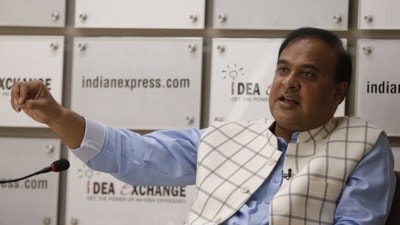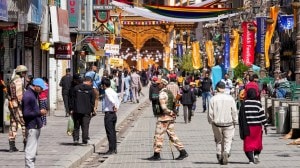Indo-Japanese ties in a nuclear era — Return to realism
J. N. DixitÃ?Foreign secretary K. Raghunath is proceeding for official bilateral discussions with his Japanese counterpart, Minori...

J. N. DixitÃ?Foreign secretary K. Raghunath is proceeding for official bilateral discussions with his Japanese counterpart, Minori Tamba, on January 27. This is a much needed and desirable development after the unfortunate coldness which emerged in Indo-Japanese relations as a consequence of India’s nuclear tests in May 1998.
India and Japan, though linked by cultural and religious relationships stretching over centuries, generally developed under the shadow of the Cold War. There was a certain empathy in terms of contemporary politics. The Japanese victory over Russia in 1907 was an impulse to the Indian freedom struggle in terms of acquiring self-confidence that an Asian power could be more than a match to a European power.
India did not climb the bandwagon of condemnatory, pressure tactics to which Japan was subjected in the immediate aftermath of the Cold War. But Japan’s involvement with the US in economic and security terms, and India’s distance from the US inhibited bilateral relations — though economic and technological cooperation has continued to grow since the mid-’60s.
These relations were galvanised only after the end of the Cold War and India’s economic liberalisation and reforms programmes which commenced in 1991.
Japan has been India’s largest bilateral donor since 1989. Japan has been giving grant assistance to India of the order of five to six billion yen annually. It is India’s fourth largest trading partner, Indo-Japanese trade in 1997-98 being valued at about $3.5 billion. Japan is also the fourth largest foreign direct investor in India. Japanese investments in India increased from roughly $17 million in 1991 to $480 million in 1997.
Projects involving direct Japanese investment in India between 1991 and 1998 have a value of nearly $2.1 billion supporting 927 proposals. Indo-Japanese cooperation in science and technology ranks in importance in this sphere with important countries like the US, Russia, the UK, France and Germany.The point in my referring to the substance of Indo-Japanese relations in such detail is to emphasise that these expanding and tangible relations were disrupted in the immediate aftermath of Pokharan II. The Hashimoto government’s reaction to our nuclear tests was highly critical.
It was among the first countries to impose bilateral economic sanctions against India; it also froze grant assistance for non-humanitarian projects. Japan opposed grant of loans to India by the IBRD and the Asian Development Bank and withdrew the offer to host the India Development Forum meeting in Tokyo. Besides imposing strict controls over technology transfers to India, Japan played a leading role at the G-8 meet in Birmingham, at the Security Council and at the meeting of the Board of Governors of the International Atomic Energy agency in criticising India and supporting sanctions against India.
When India offered to send a special envoy late this summer for discussions with Japan, to explain India’s position, the Japanese reaction was negative. Expressing disappointment, India noted that while Japan imposed across-the-board sanctions against India, it only froze part of grant assistance to China when it conducted nuclear tests in 1996. Japan’s decision to link the nuclear issue with the situation in J&K also generated a negative perception.
Japan’s milder reaction to the Pakistani nuclear tests without noting the fact that its weaponisation had preceded India’s only enhanced India’s disappointment. Matters were compounded further by Japan diverting some of the assistance meant for India to Pakistan between May 13 and May 28 in the hope it would prevent Islamabad from going nuclear.
But slowly Tokyo noticed that other countries like the US, France, the UK and Germany had started a dialogue with India. There was a realisation that perhaps Japan had over-reacted to India’s nuclear tests. A beginning was made for resuming the dialogue at Manila in July, when their then foreign minister met Jaswant Singh at the Asian Regional Forum meet.
The Japanese Ambassador in New Delhi played a significant role in gradually bringing Indo-Japanese relations back to normalcy. His efforts resulted in the visits of Industry Minister Sikander Bakht and former Prime Minister I.K. Gujral to Japan. A delegation from the Japan-India Business Cooperation Committee led by Nobuhiko Kawamoto visited India in November.
I visited Japan in the first fortnight of December and came back with the distinct impression that the Japanese government is inclined to move out of its critical posture against India. It would be pertinent to take note of the rationale of Japan’s criticism against India and its emerging foreign policy objectives.
We must acknowledge that Japan’s criticism of India is based on the Japanese people’s collective and direct experience of having suffered a nuclear attack. Secondly, there is a genuine strategic and security apprehension that horizontal proliferation of nuclear weapons is likely to become an incremental phenomenon in the Asian region, posing a general threat to Asian security and stability, with North Korea getting out of control, a nuclear China becoming more assertive and a possible Indo-Pak nuclear confrontation. The likelihood of other Asian countries like Iran and Iraq acquiring weapons of mass destruction is another concern. There is also an apprehension in terms of domestic politics that nationalist right-wing segments will call for the nuclear militarisation of Japan.
However, it must be noted that the Japanese government did not impose any restriction on cooperation between the private sector in Japan and its Indian counterpart. Japan’s foreign policy priorities are to maintain a practical and stable relationship with China, to normalise and then to expand relations with the Russian Federation, which would give it access to the natural resources of Siberia; to continue a close relationship with the US for security, strategic and economic purposes; and to play an important role in economic, strategic and political processes affecting ASEAN, the Asia-Pacific region and South Asia. Japan considers a long-term economic and political relationship with India as a balancing strategic factor, in the emerging competitive inter-state equations in the Asian region.
It is conscious of the importance of the Indian market and investment opportunities in this country and seems to be getting back to a realistic and practical attitude towards India. This is the context in which the forthcoming discussions between the Indian foreign secretary and Japan’s deputy foreign minister should be welcomed.
Top



- 01
- 02
- 03
- 04
- 05




























